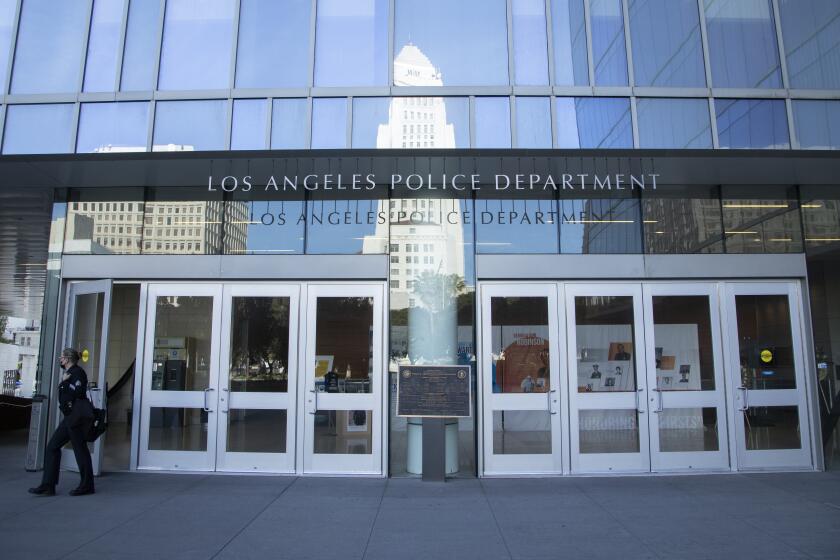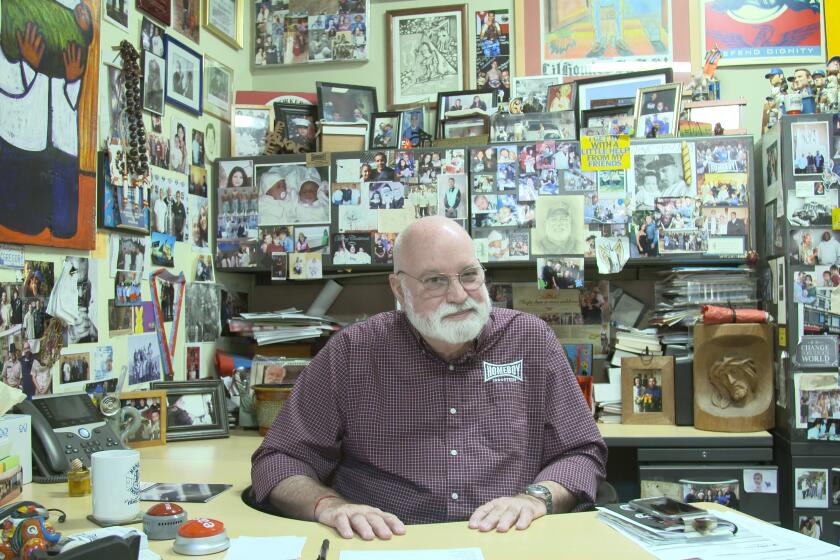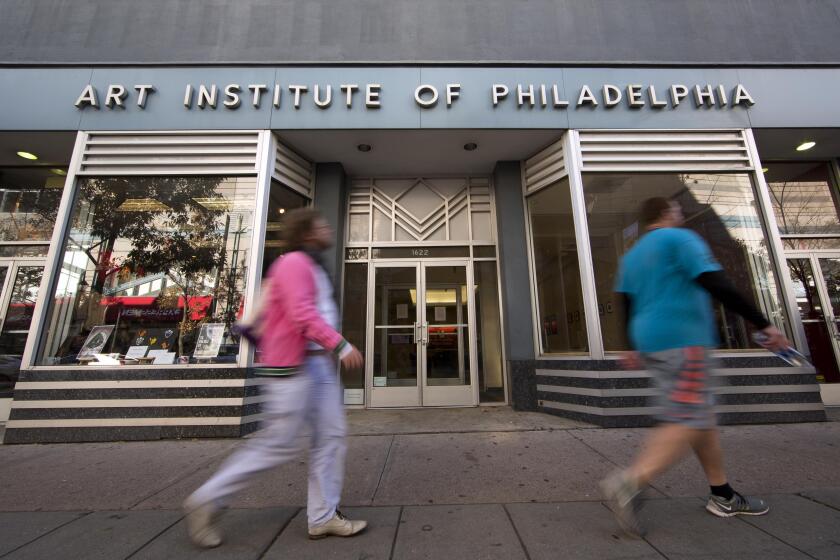Wounds That Just Won’t Heal
The Vet Center in Anaheim is a nondescript storefront in a mini-shopping plaza on Harbor Boulevard.
It’s here, less than a mile from the Magic Kingdom, that the Vietnam War is regularly played out by veterans who served their time in a place they called hell.
Seated in a circle of padded blue chairs, they share their war stories in weekly group counseling sessions. They’re middle-aged now, far removed from jungles and rice paddies. But their memories are not the type that dim with time, and what they did and saw in Vietnam continues to affect their lives.
“All my friends died over there,” said Steve Bird, 49, of Cypress, a newcomer to the Tuesday night group. He served with the 1st Infantry Division in 1966. Now a jeweler, he has run a post-Vietnam gamut of drugs and alcohol, flashbacks and depression. “I survived. I think about that. I see their faces. I see how they died. . . . It’s very hard to talk about it.”
Similar emotions are unleashed in Vet Centers in West Los Angeles, East Los Angeles and South-Central. There are 22 Vet Centers in California--202 nationwide, including those in Guam, Puerto Rico and the Virgin Islands.
Fifteen years after the first congressionally mandated Vet Centers opened to help Vietnam veterans with readjustment problems, the Department of Veterans Affairs’ Readjustment Counseling Service remains firmly entrenched. Indeed, the emotional aftershocks continue to reverberate for a minority of the estimated 3.1 million men and 7,200 women who served in the Southeast Asian war zone.
The vast majority of Vietnam veterans came home and, for better or for worse, got on with their lives: college, jobs, families.
But, according to a 1988 study, 15% of male Vietnam theater veterans (about 479,000) and 8.5% of the female theater veterans (about 610) were suffering from full-blown cases of post-traumatic stress disorder (PTSD). An additional 11% of the men and nearly 8% of the women were experiencing partial symptoms.
Not surprisingly, studies of Vietnam veterans show that the more exposure to combat they had, the more likely they are to have PTSD.
Symptoms include persistent and intrusive thoughts, nightmares, and feelings and fantasies of their traumatic experiences in Vietnam. Other symptoms are social isolation, feelings of alienation and increased arousal--difficulty falling or staying asleep, irritability or outbursts of anger, difficulty concentrating, an exaggerated startle response and extreme alertness and watchfulness.
PTSD is considered the most severe form of the natural reaction to an overwhelmingly traumatic life event--such as Bird having his foot blown off by a grenade tossed into the armored personnel carrier he and two others were riding in.
Or 47-year-old Redondo Beach veteran Les Hudelson watching a flying shard of shrapnel from a booby trap “slice off the head of the guy in front of me and put his brain on me.”
*
Hudelson is typical of Vietnam vets who have had the trauma of the war come back to haunt them.
An industrial designer who served with the 25th Infantry Division, he thought he had put Vietnam behind him more than two decades ago.
But his wife left him in 1984 after less than four years of marriage, saying that she never felt loved and that he never showed emotion. “I quit feeling in Vietnam; I turned off,” he said.
When stress over heavy financial losses finally turned him angry and belligerent, a friend gently pointed out that he had serious emotional problems. “At that point in my life,” he said, “I was a basket case.”
And when he lost virtually everything, thoughts of Vietnam returned. “I started feeling guilt--I had survivor’s guilt, guilt I killed people that were innocent, guilt that I didn’t stay over there and guilt for just everything I did. I felt like I was being punished for Vietnam. I know I wasn’t directly, but that’s what I felt like.”
It wasn’t until he broke down crying one day while hearing a helicopter overhead that he finally told himself, “I can’t go on like this.”
He went to the Veterans Affairs Medical Center in Long Beach, where he was told that he was a serious candidate for having PTSD and was referred to the Vet Center in Anaheim. That was three years ago.
“I wasn’t even aware of the impact Vietnam had on my life,” said Hudelson, who continues to attend weekly sessions.
With post-traumatic stress disorder, counselors of veterans say, the key word is post.
“The effects of being exposed to a trauma can occur any time after 30 days up to a lifetime,” said Robert Fahnestock, deputy manager of Readjustment Counseling Service’s Pacific western region and a Vietnam vet.
The point, said Al Batres, national director of the Readjustment Counseling Service, “is that post-traumatic stress disorder is no longer seen as an acute reaction a short time later, but the onset can be years later. And once you have it, it tends to have long-term effects. It’s not as easy to get rid of as we once thought.”
*
Although the storefront Vet Centers were created for Vietnam-era veterans who tended to shun the large, bureaucratic settings of VA hospitals, their clientele has been allowed to expand in recent years to include veterans of the Persian Gulf, Panama, Grenada, Lebanon and Somalia, in addition to female veterans who were sexually harassed or traumatized during their service.
But the vast majority of clients remain Vietnam War veterans. Nationwide, Vet Center counselors saw 91,972 veterans in 1994, 68% of them Vietnam vets and 60% of those with PTSD.
The average age of Vietnam veterans seeking counseling is now 47, and midlife makes them particularly vulnerable.
Counselors say, however, that any life stress--the loss of a job, a divorce, the death of a parent--carries the potential to disrupt the veteran’s life and cause war-related issues to surface.
Vet Centers offer individual and group counseling sessions for PTSD and Vietnam-related issues. Counseling and support for the families is also provided, as are referrals to drug and alcohol treatment programs.
The government-funded services are free for veterans. As Robert Key, director of the Anaheim Vet Center, said, “I tell them they paid their bill a long time ago.”
*
The Vet Center in Anaheim offers three two-hour group counseling sessions a week. The talk spans pre-military experience, the war, coming home and current issues, including personal and professional relationships.
Key, a licensed marriage, family and child counselor, said many veterans have no trouble telling their war stories. In many cases, they’ve told them dozens of times. But they often recite them with no facial expressions, he said, and it often takes six months before “the emotions bubble to the surface.”
Many Vietnam veterans view the Vet Center as a sanctuary, a place where they feel comfortable talking about the war with those who share common experiences. As one troubled member of the Tuesday night group, a Dana Point businessman, said: “This has become an oasis for me.”
Batres, the national director, said the Readjustment Counseling Service program “has been through ups and downs” over the years, with the Department of Veterans Affairs “saying we need to do away with this program or put it in the (department-run) medical centers, which is the same as doing away with it.”
“It’s very much like being a Vietnam veteran,” he added. “People have tried to forget about us and put (the program) away. Even though we are busy, there has been a tendency to ‘put Vietnam behind us.’ ”
*
Therapists say they can teach Vietnam veterans techniques to help manage the symptoms of PTSD. “We really find vets are helped considerably by treatment,” said Susan Houston, a clinical psychologist at the medical center in Long Beach.
But the veteran has to be a full partner in the treatment, she said. “He needs to come in for treatment consistently, and he needs to practice the techniques he’s taught.”
The aim, she said, “is not to forget, but to help them let go and live satisfying lives.”
But for many Vietnam War veterans with post-traumatic stress disorder, the light at the end of the tunnel seems nowhere in sight.
Anthony Vitiello of Laguna Niguel, who earned a Bronze Star for valor and a Purple Heart with the 25th Infantry Division, lost his girlfriend when he returned home to New York in 1968. She told him he just wasn’t the same person.
“Something happened to me, something was lost,” said Vitiello, whose life spun out of control after coming home: drug and alcohol abuse, anger, depression, a series of jobs lost. It was all because, he said, he no longer trusted people.
And through the years, he thought of Vietnam.
“I ate Vietnam every day,” he said. “When I sobered up (six years ago), it was all coming out of me, heavy duty.”
At 48, Vitiello is a painting contractor with a supportive wife of 15 years and a young son. But he still has intrusive thoughts of Vietnam, mood swings, insomnia and chronic depression. Some days he wakes up so depressed he stays in his house, doing what he calls “my isolation.”
Vitiello has been going to the Vet Center in Anaheim since December. But despite a sense of camaraderie and feeling he can trust those in his group, he said going to the Vet Center has not yet helped.
As he told his fellow vets at the Tuesday night counseling session: “We all had the same common denominator (of being in Vietnam), but the only difference is the level of pain we’re all going through. How long is it going to last? When does it go away? You know, I stopped the drugs; I stopped the alcohol--when do you stop paying penance and move on?”
More to Read
Start your day right
Sign up for Essential California for news, features and recommendations from the L.A. Times and beyond in your inbox six days a week.
You may occasionally receive promotional content from the Los Angeles Times.






